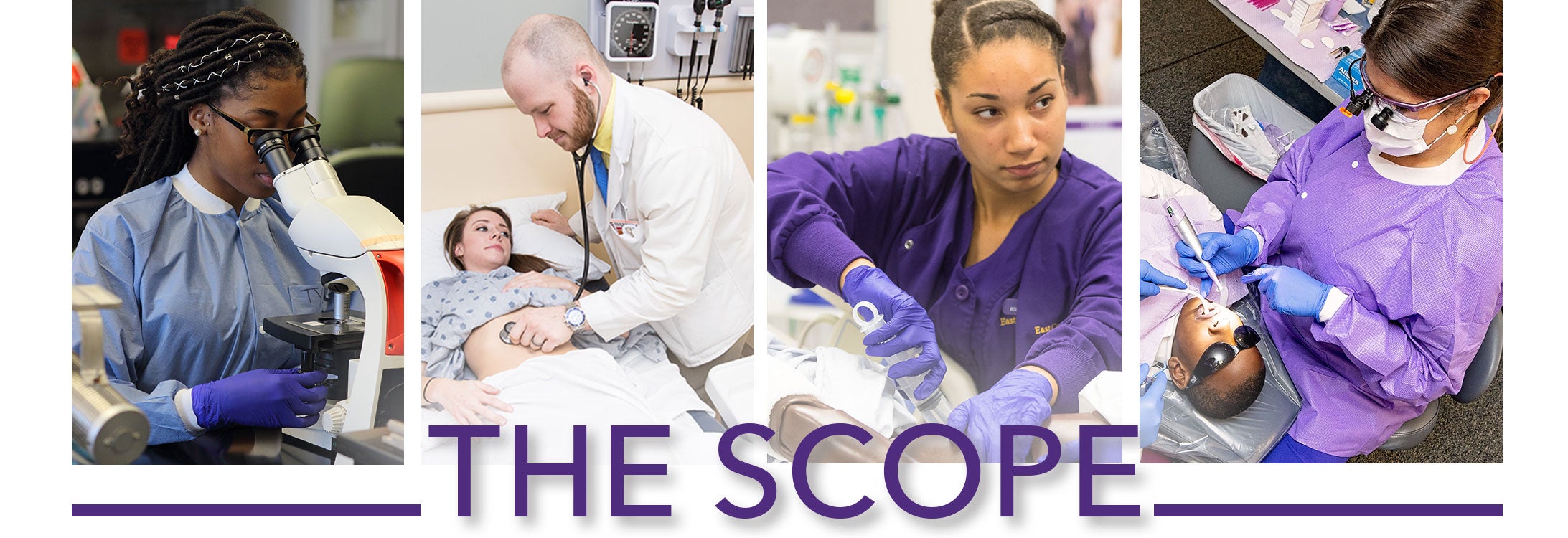July 2020
Welcome to “The Scope,” the newsletter of the ECU Division of Health Sciences.
The ECU Division of Health Sciences is North Carolina’s top producer of health care professionals; an achievement that merits individual accolades but also celebrates the essence of interprofessional collaboration.
Through our collective mission, we are able to accomplish more for the health and quality of life in this region than we could as solitary schools and colleges.
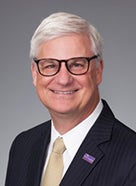
Mark Stacy, MD
We educate students who contribute to a healthier North Carolina while they are in our clinics and classrooms—and after they begin their careers across the expanse of our state. We provide solutions to health problems and health disparities using expertise, research and ingenuity that comes from a deeply rooted commitment to eastern North Carolina.
In the past several months, however, there has been a kinship among the colleges, schools, library and supporting offices—the likes of which I have never before witnessed.
That cohesive energy must not only continue, but it must flourish and thrive.
The COVID-19 pandemic revealed the Division of Health Sciences’ ability to respond to unfamiliar circumstances and to solve problems using entirely new approaches. Even when an end is in sight, it is only the beginning of a time when we must share ideas, solutions, resources and responsibilities in navigating a new landscape in health care.
As a division, our new terrain will be shaped by teamwork and togetherness. Health care is delivered in teams; we learn through teamwork.
Together, we are stronger.
That means all of us. Our new tomorrow will be a renewed and rejoined commitment to equity for each of us—for every person who works, learns and seeks care on our campus and in our facilities across the state. By caring for one another by meeting every person where they are, that teamwork takes on new meaning—only then can we provide better health care to those who come to us in need of it.
In addition to a stronger framework of collaboration and interprofessional teamwork, our future will require tireless pursuit of improved infrastructure. We will need upgraded campus facilities to educate the next generation of health care providers, and a new medical education building is only part of those needs.
I also envision a team approach to advancing our research efforts as we seek treatments and cures to health conditions that threaten eastern North Carolinians. Together, we will create new and better health care delivery methods for our region and beyond.
The days “after the pandemic” may seem beyond our sights. But these uncertain days are the ones when we can plan for the future.
They are an opportunity for the Division of Health Sciences and the people who make it what it is to come to one table and plan our next collective step forward.
We will emerge from this stronger.
Mark Stacy, MD
Dean, Brody School of Medicine
Vice Chancellor, Division of Health Sciences
Education
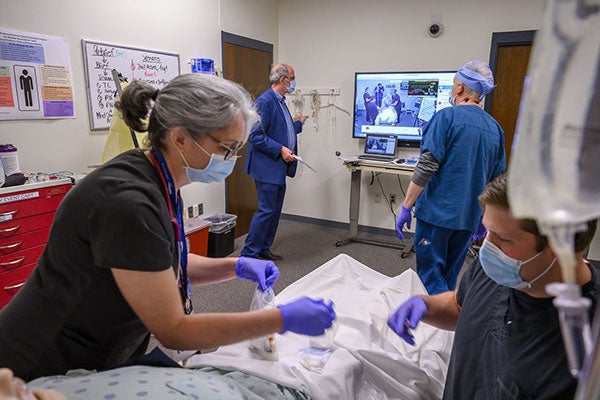
The clinical simulation lab at the Brody School of Medicine provides virtual classes for ECU medical and nursing students.
Medical and dental students have resumed clinical experiences under careful planning and safety guidelines, joining nursing students who began returning to clinical spaces in late May. Leaders across the division contributed to patient interaction protocols that include special safety measures and additional personal protective equipment.
Web-based instruction also continued, with creative and unique solutions in place to address the pause in classroom learning. Standardized patients, community members who are specially trained to help students learn to interact with real patients, stepped in to offer additional web-based education to students across the division. Technology specialists in the Office of Clinical Simulation developed telesimulation platforms using videoconferencing to provide education, training and performance assessment that students could access from off-site locations.
Good news continued to come in for colleges and schools across the division as well. The School of Dental Medicine was awarded a $3.2 million grant from the Health Resources and Services Administration to continue its Scholarships for Disadvantaged Students (SDS) program that funds scholarships for economically disadvantaged students. The project will include input from Dr. Molly Jacobs, a health economist and assistant professor in health services and information management in the College of Allied Health Sciences.
The Brody School of Medicine was selected to administer the United States Medical Licensing Examination (USMLE) Step 1 and Step 2 Clinical Knowledge examinations. Successful completion of the USMLE is required to be able to practice medicine in the U.S. Brody was selected as a site for its students and as a pilot site to administer the examination to students from other schools after review of IT testing infrastructure and its history of successfully administering other examinations developed by the National Board of Medical Examiners.
“These high-stakes examinations require a sophisticated proctoring and testing environment,” said Dr. Robert Carroll, Brody’s associate dean of medical education. “The Brody School of Medicine was selected as one of two schools in North Carolina to administer the USMLE Step 1 and USMLE Step 2 CK examinations, allowing our students to schedule these examinations at a convenient location and allowing other students increased flexibility in scheduling the examinations.”
Visit this video on YouTube for the closed-captioned version.
Patient Care
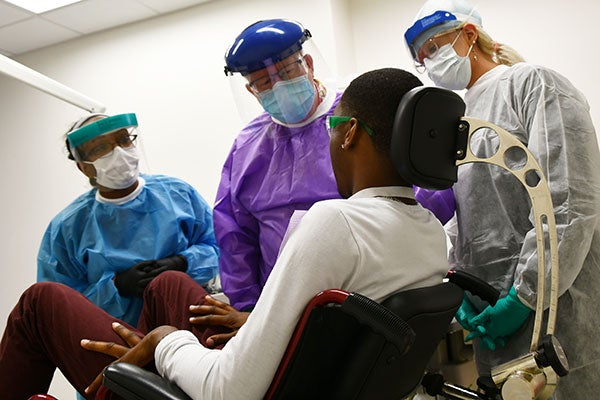
The School of Dental Medicine was awarded a $3.1 million grant to enhance resident training in the care of patients with special needs in eastern North Carolina and across the state.
In addition to students returning to clinical care across the division, ECU Physicians continues to provide the most comprehensive care in eastern North Carolina through in-person and virtual patient visits.
As the pandemic impacts not only physical health but mental health as well, our experts share research findings and information about caring for people across the state now and after the pandemic subsides. Dr. Sy Saeed shared details on how the ECU-led state telepsychiatry partnership can help provide mental health care through telemedicine and virtual visits. The North Carolina Statewide Telepsychiatry Program recently received a 2020 Breaking Barriers Through Telehealth Award from the Mid-Atlantic Telehealth Resource Center, for its efforts to provide care and prevent unnecessary hospitalizations.
The School of Dental Medicine was awarded a $3.1 million grant to enhance resident training in the care of patients with special needs in eastern North Carolina and across the state. The award from the Health Resources and Services Administration, one of the largest in the dental school’s history, will focus on improving dental care for pediatric and elderly patients as well as those with mobility issues and other complex health problems and those with mental, emotional and behavioral challenges.
A College of Nursing faculty member is working to improve population health across North Carolina. Dr. Jan Tillman, a clinical associate professor and board-certified family nurse practitioner, is coordinating a collaboration between the ECU College of Nursing and the North Carolina Department of Health and Human Services (NCDHHS), pairing health care providers across the state with the long-term care facilities that need them urgently.
A three-year, $302,629 grant is helping the Department of Addictions and Rehabilitation Studies at ECU address the risk factors associated with suicide on campus. The grant, Suicide Education and Prevention at ECU, was funded by the Garrett Lee Smith Campus Suicide Prevention program at the Substance Abuse & Mental Health Services Administration. It is aimed at engaging ECU faculty, staff and students to increase their knowledge and skills for identifying and addressing the underlying factors most frequently associated with suicide.
Research

Dr. Holly Wei
The division’s dedication to research is as strong as ever across a variety of disciplines, underscoring our faculty as national leaders in their fields.
Dr. Jamie DeWitt, associate professor in Brody’s Department of Pharmacology and Toxicology, was among 16 scientists from universities, the U.S. National Institutes of Health, the European Environment Agency and NGOs that recently published a peer-reviewed article in Environmental Science & Technology Letter urging governments and businesses to treat all per- and polyfluorinated substances (PFAS) as one class and to avoid them for nonessential uses due to their harmfulness.
The ECU-led Pitt County Community Prevention and COVID-19 Testing Study is now underway, and project leaders are seeking participants in Pitt County. The project is part of a statewide partnership exploring the impact of the COVID-19 coronavirus pandemic on North Carolina and is led by a team of ECU public health experts. Based in ECU’s Brody School of Medicine and the College of Nursing, the researchers join others from UNC-Chapel Hill, Duke University and the N.C. Division of Public Health.
Brody School of Medicine researchers are studying the potential pharmaceutical benefits of a sea sponge. Dr. John Cavanagh’s team is exploring how a molecule emitted from the sponge, Agelas conifera, overcomes all of the ways bacteria resist antibiotics – thus making antibiotics more effective.
Nicole Arnold, an assistant professor in the College of Allied Health Sciences’ Department of Nutrition Science, worked in coordination with other ECU experts to create guidelines for food safety during the COVID-19 pandemic.
A faculty member in the College of Nursing helped author a study that provided guidance to help nurses adjust psychologically to the demands of serving on the front lines during the pandemic. Dr. Holly Wei says that evidence indicates a prevalent increase in mental health issues for front-line health care providers working closely with patients during a global pandemic.
Although Laupus Library’s physical doors aren’t open, it continues to fulfill the research, service and informational needs of the health sciences community. Laupus librarians and other staff have contributed to collaborative efforts across the division to ensure access to resources for faculty and students.
Philanthropy
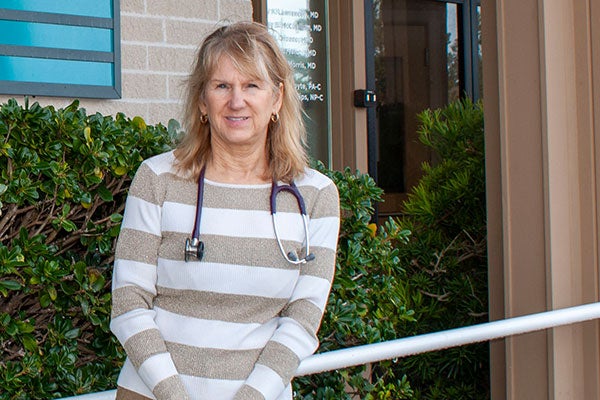
Mary Katherine Lawrence
On June 24, Pirate Nation came together like never before and helped ECU raise more than $3.1 million on its annual giving day, Pirate Nation Gives. The total surpassed last year’s amount of $805,000 and exceeded the initial goal of raising $1 million. The one-day, social media-driven effort brought alumni, faculty, staff, students, parents and friends together to support worthy university causes.
Notable donors from the 2020 Pirate Nation Gives event include Patricia Morris (Nursing ’85) who established the Morris Family Faculty Support Endowment to support faculty and resources in the College of Nursing. Bridget Rogers (Nursing ‘77) created the Bridget Frazier Rogers Faculty Support Endowment in the College of Nursing for general faculty support, professional development or salary as determined by the dean for highest and best use within the college. Rogers sees the faculty as crucial to continuing to produce great nurse leaders at ECU.
Mary Katherine Lawrence created an endowed professorship in endocrinology; her gift also supports global medical experiences for students. While Lawrence did not attend ECU, one of her sons graduated from the risk insurance management program and another is a current student at Brody.
Learn more about how you can support the mission of ECU’s Division of Health Sciences through the ECU Medical & Health Sciences Foundation, Inc..
Visit this video on YouTube for the closed-captioned version.
DHS Spotlight
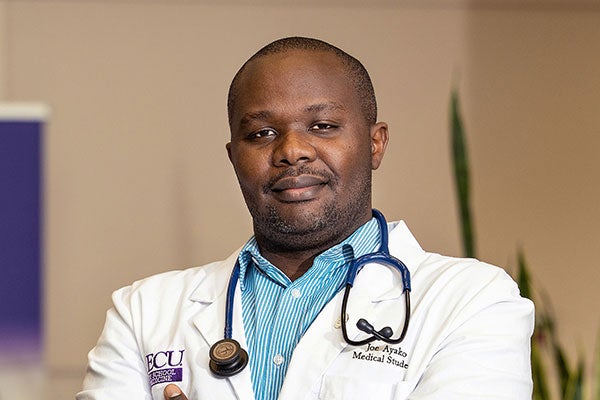
Ongeri Ayako
In the spirit of excellence in education and a collaborative campus, we will be highlighting a variety of students who represent the colleges and schools in the Division of Health Sciences.
This month, we meet Ongeri Ayako, a student in the Brody School of Medicine.
Ayako, originally from Kenya, began working in the medical field as a hospice nurse in Charlotte for almost eight years. During his time there, Ayako provided care for patients battling diseases like cancer. The connections that Ayako has made from learning experiences as a nurse and in medical school have broadened his methods towards patient care.
“They made me want to find a way to not just help them towards the end of life, but when they are trying to battle the disease at the hardest stages,” Ayako said.
Being involved in organizations like Brody’s Student National Medical Association and Brody Ambassadors, Ayako has a lot to balance as a medical student. He has become more familiar with the rigors of balancing medical school and family life after juggling his white coat ceremony and the birth of his second child on the same day.
He encourages others around him to be active participants in making a difference.
“Be the change that you want to see,” he said. “There’s no point in complaining if you’re not going to do something about it. So when I saw patients telling me their stories, I thought, ‘What can I do to impact their lives?’”
